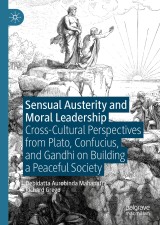Details

Sensual Austerity and Moral Leadership
Cross-Cultural Perspectives from Plato, Confucius, and Gandhi on Building a Peaceful Society|
96,29 € |
|
| Verlag: | Palgrave Macmillan |
| Format: | |
| Veröffentl.: | 05.12.2021 |
| ISBN/EAN: | 9783030891510 |
| Sprache: | englisch |
| Anzahl Seiten: | 182 |
Dieses eBook enthält ein Wasserzeichen.
Beschreibungen
<p>This book examines the link between sensual austerity and moral leadership—a topic largely neglected in contemporary academic scholarship and public policy—by exploring the comparative cross-cultural perspectives of Plato, Confucius, and Gandhi, on this theme. Despite the diverse cultural contexts that gave rise to their respective philosophical perspectives, they shared similar views on what might constitute a universal and perennial basis for individual moral development in any harmonious political order. They all agreed that sensual austerity is necessary for the realization of a flourishing society and political culture: recognizing that control over sensual desire is both a vehicle for individual moral self-cultivation and social-political progress. Sensual austerity is thus an essential aspect of any morally governed person, institution, state, or society. The book also argues that further examination of this theme may assist scholars and policymakers in developing more peaceful and harmonious national and global communities.</p><p></p>
<p>1. Introduction</p><p>2. The Philosopher King: Body, Mind, and Eros</p><p>3. Moral Social Order and the Ideal Ruler, the Sage-King</p><p>4. Brahmacharya, Nonviolent Social Praxis, and Leadership</p><p>5. Parallels, Variations, and Pathways</p>
<p><b>Debidatta Aurobinda Mahapatra</b> is a Professor of Political Science at Florida State College at Jacksonville, USA.</p>
<p><b> </b></p>
<p><b>Richard Grego</b> is a Professor of Philosophy and Cultural History at Florida State College at Jacksonville, USA.<br></p>
<p><b> </b></p>
<p><b>Richard Grego</b> is a Professor of Philosophy and Cultural History at Florida State College at Jacksonville, USA.<br></p>
<p>This book examines the link between sensual austerity and moral leadership—a topic largely neglected in contemporary academic scholarship and public policy—by exploring the comparative cross-cultural perspectives of Plato, Confucius, and Gandhi, on this theme. Despite the diverse cultural contexts that gave rise to their respective philosophical perspectives, they shared similar views on what might constitute a universal and perennial basis for individual moral development in any harmonious political order. They all agreed that sensual austerity is necessary for the realization of a flourishing society and political culture: recognizing that control over sensual desire is both a vehicle for individual moral self-cultivation and social-political progress. Sensual austerity is thus an essential aspect of any morally governed person, institution, state, or society. The book also argues that further examination of this theme may assist scholars and policymakers in developing more peaceful and harmonious national and global communities.</p>
<p>Examines the link between sensual austerity and moral leadership</p><p>Focuses on the cross-cultural perspectives of Plato, Confucius, and Gandhi</p><p>Calls for incorporation of ideas from non-Western thought into political theory in an increasingly globalized world</p>
<p>"Austerity is indeed a key to moral development and moral leadership. Self-restraint in today’s world is in short supply and a cause of much dysfunction. This book is important and timely." (Thomas Patterson, Bradlee Professor of Government and the Press, Kennedy School of Government, Harvard University, USA)</p><p></p><p></p><p><br></p><p>"This book is significant and very timely in understanding and responding to current crises. Our contemporary world expresses and promotes undisciplined sensual desires, amoral and immoral leadership, and lack of harmonious and peaceful relations. In this bold comparative cross-cultural interpretation of Plato, Confucius, and Gandhi, the authors examine very diverse but interconnected perspectives on the need for sensual austerity that is integrally related to moral leadership and to building greater harmony and peace." (Douglas Allen, Professor Emeritus of Philosophy, the University of Maine, USA)</p><p></p>
<p> </p>
"This unique book examines the connection between two fundamentals (sensual austerity and moral quintessence) in self-cultivation; and its importance to political leadership and social order. It examines the issues by consulting advocacies of Plato, Confucius, and Gandhi. Braving the hazard of tackling three thinkers from disparate cultures, it demonstrates that they all agreed that sensual austerity (including but not limited to abstinence on gender issues) is necessary for a flourishing society and political culture." (James C. Hsiung, Professor of Politics and International Law, New York University, USA)<p></p><p></p>
<p> </p>
"Through the pivotal figures of Confucius, Plato, and Gandhi, Debidatta Mahapatra and Richard Grego explore the largely forgotten, but once commonly understood, connection between sensual austerity and moral leadership. Drawing on these important figures, the authors make the persuasive case that leadership demands attention to personal morality -- and that widespread virtue is the foundation of thriving republics. Given recent developments, this lesson demands the serious attention of all concerned citizens." (David Lay Williams, Professor of Political Science, DePaul University, USA)<p></p><p></p>
<p> </p>
"This unique book examines the connection between two fundamentals (sensual austerity and moral quintessence) in self-cultivation; and its importance to political leadership and social order. It examines the issues by consulting advocacies of Plato, Confucius, and Gandhi. Braving the hazard of tackling three thinkers from disparate cultures, it demonstrates that they all agreed that sensual austerity (including but not limited to abstinence on gender issues) is necessary for a flourishing society and political culture." (James C. Hsiung, Professor of Politics and International Law, New York University, USA)<p></p><p></p>
<p> </p>
"Through the pivotal figures of Confucius, Plato, and Gandhi, Debidatta Mahapatra and Richard Grego explore the largely forgotten, but once commonly understood, connection between sensual austerity and moral leadership. Drawing on these important figures, the authors make the persuasive case that leadership demands attention to personal morality -- and that widespread virtue is the foundation of thriving republics. Given recent developments, this lesson demands the serious attention of all concerned citizens." (David Lay Williams, Professor of Political Science, DePaul University, USA)<p></p><p></p>

















